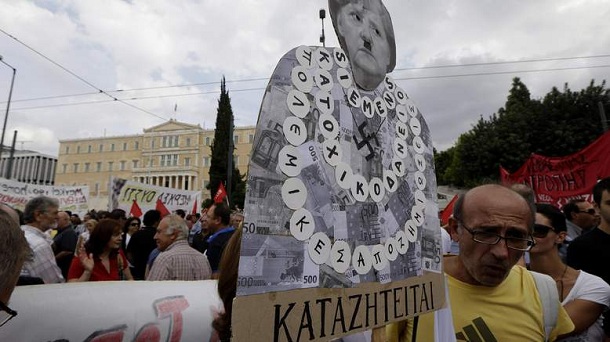Reparations are a touchy issue when it comes to the Second World War. Generally, any that need to be made are negotiated by treaty at war’s end, but this is not always the case and sometimes nations later feel that they got the short end of the stick. Such is the case with Greece, who lost almost a tenth of their civilian population and almost all of their finances during WWII. While Germany has long held that their post-war negotiations were solution enough, Greece continues to demand further reparations.
In 1990, Europe appeared to have put the issue to rest. Several major nations arranged a settlement, and all current members of the European Union agreed that it was to be considered official. This meant that Germany was done paying reparations to anyone. Then, twenty years later, Greece began to disagree with the idea when Germany took a hand in controlling their struggling economy. This led to reductions in spending, which unfortunately did not halt the rising unemployment rates.
Many Germans feel that Greece is to blame for its own state of affairs, as the economy was not doing well when Germany agreed to aid them. In fact, Germany considers Greece to be heavily in debt due to the loan they were given when in need of a bailout. A possible settlement for reparations that has been suggested would be to simply eliminate the need for Greece to pay Germany back. This idea actually carries some weight, as Germany took payments from Greece during their WWII occupation of the small country. Taking inflation into account, the loans are estimated to be about equal, which would solve the debate, the Al Jazeera English reports.
One thing that seems clear is that if Germany does hand over any money to Greece, it is doubtful that it will go to the citizens. While there are still survivors who lost relatives to Nazi-committed atrocities, it is generally agreed that reparations are generally given to the government, not the governed. This means that Greek citizens might not actually see much benefit from the money depending upon how it is used.
No one has promised reparations as of yet, but Angela Merkel has agreed to let the Greeks negotiate rather than simply turning them down as they have been in the past. This has resulted in mixed reactions from German citizens, some who feel the money is owed and some who vehemently deny that Germany owes anything since the 1990 settlement. No matter how Germany feels about it, many Greeks remain hopeful that further reparations will be made, hopefully ending the issue once and for all.
